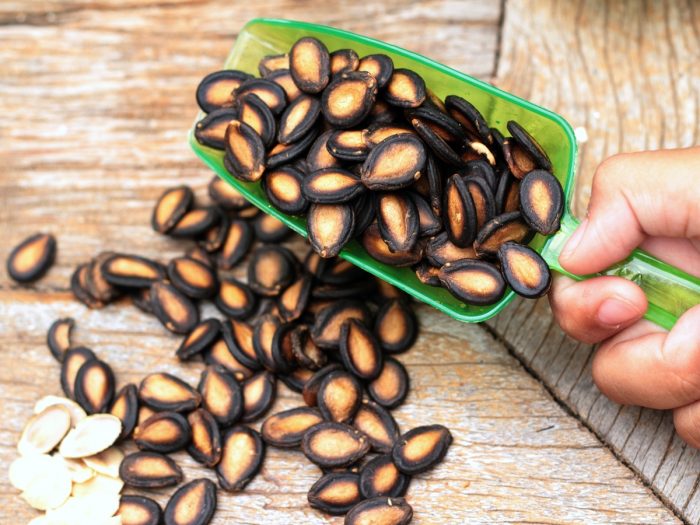Many people have never heard of watermelon seed oil but this concentrated extract has quite a few applications for your overall health and wellness.
What is Watermelon Seed Oil?
Watermelon seed oil is an essential oil that is extracted from watermelon seeds. When the seeds have been dried and toasted, they are then put through one of the various processes, cold pressing, solvent extraction or carbon dioxide extraction. Cold pressing is the most common method for removing this concentrated seed oil. This oil has been used for centuries in Africa as a traditional remedy for many health ailments. It has only recently become more widely available in other areas of the world. [1]
Watermelon seed oil has a slightly nutty scent and is a light yellow in color. It is also known as a very light oil. It readily absorbs into the skin and has a shelf life of approximately two years, if stored in a dark bottle in a cool, dry place away from direct sunlight. This essential oil is primarily used as a topical remedy, but it can be consumed in small amounts in certain culinary settings. Moderation, as always, is recommended, both for topical and internal use. There are also a significant number of fatty acids in this oil, which may be why it is occasionally used as a cooking oil and some internal health benefits. [2]

Try roasted watermelon seeds for a quick and healthy snack. Photo Credit: Shutterstock
Health Benefits of Watermelon Seed Oil
There are many impressive health benefits of watermelon seed oil, including its ability to moisturize the skin, detoxify the body, reduce inflammatory conditions, eliminate acne, eliminate signs of premature aging, and strengthen the hair, among others.
Skin Care
Watermelon seed oil, with various minerals, antioxidants, & unsaturated fatty acids like oleic acid, omega 3 & 6, & various vitamins, is known for moisturizing dry skin. It is also an excellent carrier oil, which is able to deliver other active ingredients and nutrients to deeper layers of the skin. [3]
Anti-aging Agent
With a good amount of antioxidants, including phenolic compounds, lycopene, and carotenoids, this oil is able to reduce the appearance of wrinkles, age spots, and blemishes. [4]
Anti-inflammatory Agent
Applying this oil to inflamed areas, such as psoriasis, rosacea, eczema or acne patches can quickly reduce the irritation and treat any underlying infection that may be causing the inflammation. [5]
Detoxifying Agent
Studies have found that topical or internal use of this oil can help to detoxify the body, both by clearing out the pores and stimulating the function of the liver, keeping your body free of toxins inside and out. This oil is also known as a diuretic, which further helps reduce toxins in the body. [6]
Hair Care
Applying this oil to the hair can improve luster, reduce inflammation on the scalp, and strengthen your locks, thanks to high levels of vitamin E and antioxidants.
Uses of Watermelon Seed Oil
There are quite a few uses of watermelon seed oil, including as a culinary ingredient and as a part of certain cosmetic products, soaps, foaming products, and other skin products. Due to the high levels of vitamin E and vitamin A found in this oil, it is particularly popular in cosmetic and topical applications, including as an ingredient in many natural moisturizers and salves. In the kitchen, watermelon seed oil has traditionally been used as cooking oil for centuries in Africa, but due to its relative cost and availability in other parts of the world, it is not commonly used as a basic cooking oil.
Word of Warning
Excessive use or consumption of watermelon seed oil can have some negative side effects, such as excessive blood vessel dilation, which can cause a dangerous drop in blood pressure. Some skin irritation can also result if an excessive amount is used topically.
